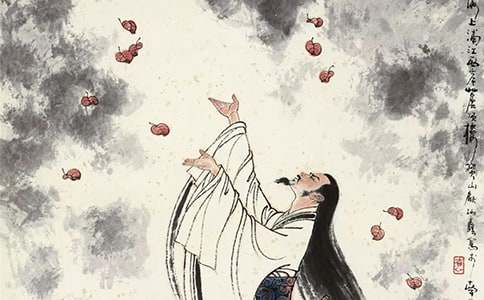- 相干保举
《离骚》双语美文赏识
指导语:《离骚》是与端五节相干的国粹作品,以下是百分网小编分享给大师的《离骚》双语美文赏识,接待浏览!

Li Sao is a Chinese poem dating from the Warring States Period, largely written by Qu Yuan (340 BC - 278 BC) of the Kingdom of Chu. One of the most famous poems of pre-Qin China, it is a representative work of the Chu Ci form of poetry.
《离骚》是战国期间的诗歌,大局部由楚国屈原(公元前340-278)创作。作为楚辞的代表作,《离骚》是先秦期间最闻名的诗歌之一。
The title's meaning has been debated about even in historical times. Sima Qian interprets the title as "Woes of Departure" i.e. Qu Yuan's exile, while Ban Gu interprets it as "Encountering Trouble". Sima Qian's interpretation is the more adopted one, though recent scholars also theorise that Li Sao is simply a different way of writing Lao Shang; the latter is a generic name for a Chu song. In English the title is often translated as either The Lament or Encountering Trouble.
“离骚”这个标题题目的意思在汗青上很有争议。司马迁将其翻译为“拜别之悲伤”意指屈原被放逐;班固将其译为“遭受忧患”。固然新进学者们以为“离骚”只是“劳商”的另外一种写法,而“劳商”即楚国歌曲的总称,人们仍是多以司马迁的译法为准。英语中“离骚”普通被翻译为“悲歌”或“遭受忧患”。
The poem has a total of 372 lines and about 2400 characters, which makes it one of the longest poems dating from Ancient China. While the precise date of composition is unknown it is one of Qu Yuan's later works, written after his exile by King Huai I of Chu.
《离骚》共有372行,2400余字,是中国现代以来最长的诗歌之一。固然《离骚》的详细创作时候未知,但能够肯定它是在屈原被楚怀王放逐以后的作品。
As a representative work of Chu poetry it makes use of a wide range of metaphors derived from the culture of Chu, including shamanistic elements such as divination and the presence of spirits, as well as references in ancient history and legendary figures. Because of these influences the poem is seen as an initiator of a Romantic tradition of poetry in China.
作为楚辞的代表作,《离骚》中有大批源自楚国文明的比喻,包含占卜、显灵等萨满教元素,和汗青和神话传说中的人物抽象。是以,这首诗首创了中国诗歌的浪漫主义先河。
【《离骚》双语美文赏识】相干文章:
精选双语美文赏识10-07
《顽强》双语美文赏识10-15
双语英语美文赏识05-24
双语美文赏识《缔造机遇》10-01
美文赏识:父爱无言(双语)11-05
《咀嚼此刻》双语美文赏识05-09
英语美文故事赏识(双语)10-12
双语美文赏识《学会自我陪同》08-26
《生而为赢》双语美文赏识09-20
双语美文赏识《多留意,多支出》09-06